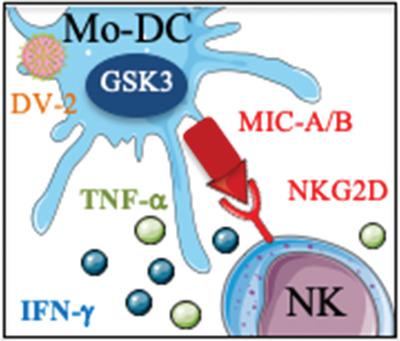当前位置:
X-MOL 学术
›
Eur. J. Immunol.
›
论文详情
Our official English website, www.x-mol.net, welcomes your feedback! (Note: you will need to create a separate account there.)
Glycogen synthetase kinase 3 inhibition drives MIC-A/B to promote cytokine production by human natural killer cells in Dengue virus type 2 infection.
European Journal of Immunology ( IF 5.4 ) Pub Date : 2019-12-01 , DOI: 10.1002/eji.201948284 Caroline Petitdemange 1 , Christopher Maucourant 1 , Nadine Tarantino 1 , Juliana Rey 1 , Vincent Vieillard 1
European Journal of Immunology ( IF 5.4 ) Pub Date : 2019-12-01 , DOI: 10.1002/eji.201948284 Caroline Petitdemange 1 , Christopher Maucourant 1 , Nadine Tarantino 1 , Juliana Rey 1 , Vincent Vieillard 1
Affiliation

|
Dengue virus (DENV) is the most widespread arbovirus worldwide and is responsible for major outbreaks. The host's immune response plays a crucial role in controlling this infection but might also contribute to the promotion of viral spread and immunopathology. In response to DENV infection, NK cells preferentially produce cytokines and are cytotoxic in the presence of specific antibodies. Here, we identified that DENV-2 inhibits glycogen synthase kinase 3 (GSK-3) activity to subsequently induce MHC class-1-related chain (MIC) A and MIC-B expression and IL-12 production in monocyte-derived DCs, independently of the STAT-3 pathway. The inhibition of GSK-3 by DENV-2 or small molecules induced MIC-A/B expression on monocyte-derived DCs, resulting in autologous NK cells of a specific increase in IFN-γ and TNF-α production, in the absence of direct cytotoxicity. Together, these findings identified GSK-3 as a regulator of MIC-A/B expression and suggested its role in DENV-2 infection to specifically induce cytokine production by NK cells.
中文翻译:

糖原合成酶激酶3的抑制作用可驱动MIC-A / B促进2型登革热病毒感染人类自然杀伤细胞产生细胞因子。
登革热病毒(DENV)是全球最广泛的虫媒病毒,是造成重大疫情的原因。宿主的免疫反应在控制这种感染中起着至关重要的作用,但也可能有助于促进病毒传播和免疫病理学。响应DENV感染,NK细胞优先产生细胞因子,并且在存在特异性抗体的情况下具有细胞毒性。在这里,我们确定DENV-2抑制糖原合酶激酶3(GSK-3)的活性,以随后独立地诱导单核细胞来源的DC中的MHC 1类相关链(MIC)A和MIC-B表达以及IL-12的产生。 STAT-3途径的作用。DENV-2或小分子对GSK-3的抑制作用诱导了单核细胞衍生DC上MIC-A / B的表达,从而导致自体NK细胞的IFN-γ和TNF-α产生特异性增加,在没有直接细胞毒性的情况下。总之,这些发现确定了GSK-3是MIC-A / B表达的调节剂,并暗示了其在DENV-2感染中特异性诱导NK细胞产生细胞因子的作用。
更新日期:2019-12-02
中文翻译:

糖原合成酶激酶3的抑制作用可驱动MIC-A / B促进2型登革热病毒感染人类自然杀伤细胞产生细胞因子。
登革热病毒(DENV)是全球最广泛的虫媒病毒,是造成重大疫情的原因。宿主的免疫反应在控制这种感染中起着至关重要的作用,但也可能有助于促进病毒传播和免疫病理学。响应DENV感染,NK细胞优先产生细胞因子,并且在存在特异性抗体的情况下具有细胞毒性。在这里,我们确定DENV-2抑制糖原合酶激酶3(GSK-3)的活性,以随后独立地诱导单核细胞来源的DC中的MHC 1类相关链(MIC)A和MIC-B表达以及IL-12的产生。 STAT-3途径的作用。DENV-2或小分子对GSK-3的抑制作用诱导了单核细胞衍生DC上MIC-A / B的表达,从而导致自体NK细胞的IFN-γ和TNF-α产生特异性增加,在没有直接细胞毒性的情况下。总之,这些发现确定了GSK-3是MIC-A / B表达的调节剂,并暗示了其在DENV-2感染中特异性诱导NK细胞产生细胞因子的作用。



























 京公网安备 11010802027423号
京公网安备 11010802027423号